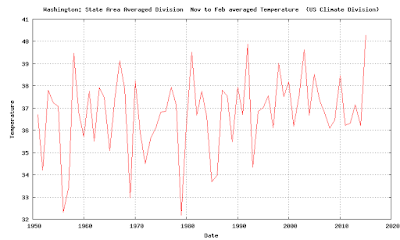Last winter and this spring have been a different animals meteorologically, at odds with anything we have seen before.
So unique that it should give forecasters pause.
So unique that it is probably not the result of global warming.
Let's start with the Big Kahuna. The lack of snow. For a number of locations, this year had the lowest April 1 snowpack on record. Here is a plot of April 1 snowpack (snow water) over the Northwest from 1984 to 2015 (green lines). 2015 was the lowest.
But it is more interesting than that! The lack of snowpack was NOT associated with a lack of precipitation....which is really unprecedented. Virtually every other low snowpack year was a precipitation drought year as well. But NOT this year. To demonstrate, here is a plot of average winter precipitation since 1950 over Washington State. Our last winter was run of the mill. But check out the previous low snowpack years (2005, 2001, 1992): all low precipitation years.
So how could we have normal precipitation but poor snowpack? The answer: crazy warm temperatures. Take a look at a plot of Washington State Nov-Feb. temperatures since 1950. This year was the warmest.
But wait, there's more! Something weird and extremely unusual is occurring in the tropical Pacific. El Nino is revving up rapidly, which is very uncommon during the spring. The sea surface temperature in the central Pacific (Nino 3.4 area) shows the warming.
It is increasingly looking like we may have a super El Nino later this year. And that will have a significant impact on NW weather.
So why are these unusual events happening?
Some will be quick to blame global warming from increasing greenhouse gases, but that is an unlikely explanation of a sudden, one-off year like this. Greenhouse gas induced changes would be expected to develop more gradually.
Random, natural variability is more likely as the cause.
Of course, some will have other explanations: aliens, secret government weather control projects gone wrong and other ideas we won't get into.
There is simply no analog for last winter and this spring in the Northwest. It stands by itself. And that is why folks (and the media) have to be very, very careful in assuming what the impacts of this weird weather will be.
My next blog will consider one such claim: that the low snowpack will result in huge and frequent wildfires this summer. It may sound plausible, but as we will see, there are problems with some of the assumption being made.
The European social model is a common vision many European states have for a society that combines economic growth with high living standards and good ...
Subscribe to:
Post Comments (Atom)















No comments:
Post a Comment